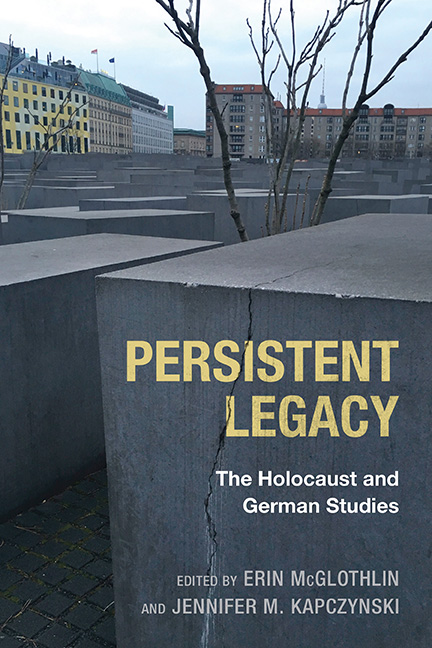Book contents
- Frontmatter
- Contents
- Acknowledgments
- Introduction
- Part I Abiding Challenges
- Part II The Holocaust in German Studies in the North American and the German Contexts
- Part III Disentangling “German,” “Jewish,” and “Holocaust” Memory
- Part IV Descendant Narratives of Survival and Perpetration
- Part V Remediated Icons of Memory
- Part VI Holocaust Memory in Post-Holocaust Traumas
- Notes on the Contributors
- Index
12 - Goebbels’s Fear and Legacy: Babelsberg and Its Berlin Street as Cinematic Memory Place
Published online by Cambridge University Press: 17 June 2021
- Frontmatter
- Contents
- Acknowledgments
- Introduction
- Part I Abiding Challenges
- Part II The Holocaust in German Studies in the North American and the German Contexts
- Part III Disentangling “German,” “Jewish,” and “Holocaust” Memory
- Part IV Descendant Narratives of Survival and Perpetration
- Part V Remediated Icons of Memory
- Part VI Holocaust Memory in Post-Holocaust Traumas
- Notes on the Contributors
- Index
Summary
IN OCTOBER 2013, excavators entered the backlot of the film studios in Babelsberg near Berlin, at the precise location of one of its most famous movie sets. The so-called Berlin Street, first built for Leander Hausmann's post-GDR comedy Sonnenallee (English title, Sun Alley, Germany, 1999) had since served as the set for approximately 350 feature and television films, video clips, and commercials. But this time the construction vehicles were serving neither as props for another film nor to prepare the site for a new international production. On the contrary, this time the excavators and welding torches were there to finally pull down the set that had become so integral to the international success of the Babelsberg studios as a globally accepted production ground, one especially suited to hosting historical films and equipping them with period props. In particular, the Berlin Street set had itself become a visual icon in the cinematic reconstruction of the Nazi past, in large part because of how many internationally successful and influential films were shot there. These include The Pianist (UK, Germany, Poland, France, 2002, dir. Roman Polanski), The Reader (USA, Germany 2008, dir. Steven Daldry), and Inglourious Basterds (USA, Germany, 2009, dir. Quentin Tarantino). It was also home to such popular German television movies as Nacht über Berlin (Night over Berlin, Germany 2013, dir. Friedemann Fromm) and Unsere Mütter, unsere Väter (English title, Generation War, Germany 2013, dir. Philipp Kadelbach). In this essay I investigate the correlations of set design, the specific heritage and legacy of film production in Babelsberg, and the ongoing popularity of historical films concerning the Nazi past that were and still are produced in Babelsberg. In doing so I intend to combine the fields of German history, film production studies, and Holocaust memory studies in order to delineate a new perspective on contemporary German historical films as they are relevant for German, Holocaust, and memory studies.
The Changing Faces of Babelsberg
Film sets have a peculiar nature. As Bergfelder, Harris, and Street say in their book Film Architecture and the Transnational Imagination, on the one hand they “provide a film with its inimitable look, its geographical, historical, social and cultural context” Thus they serve as an intensifying element of the mood and atmosphere as well as for the social and historical background of the story.
- Type
- Chapter
- Information
- Persistent LegacyThe Holocaust and German Studies, pp. 229 - 248Publisher: Boydell & BrewerPrint publication year: 2016



